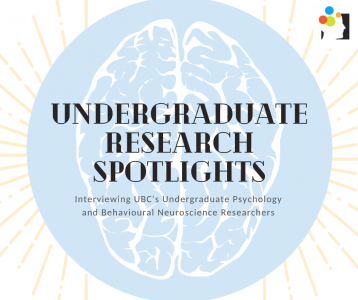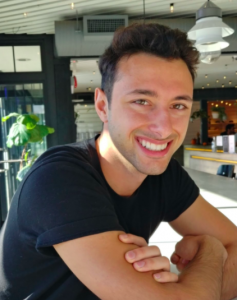3rd Year Psychology, Honours

By: Muthaira Abid and Lauryn Murray
Could you tell us your major, what year you’re in and where you’re from?
I am in my third year in the Psychology Honours Program. I am from North Vancouver, BC
What are your preferred pronouns?
He/Him
Tell us one fun fact about yourself.
I have a massive whiteboard in my room and I use it for just about everything.
Could you give us a short overview of your honours project? Starting off with your research topics?
Yes, for sure. My research looks at the role of empathy during the COVID 19 pandemic. I developed the hypothesis in my health psych class – PSYC 427 advanced seminar for health psychology. I was reading some of the research on past global pandemics, and saw that providing empathy was a pretty consistent theme. So with the thesis, I was interested in how empathic responding functions to buffer against stress during the pandemic.
What sparked your interest in your research topic and how did you build your hypothesis?
So in the summer, I was thinking about what kind of research I could pursue. Covid-19 was something that I was personally dealing with along with the people around me. I was also engaging in those conversations in class about adaptive coping behaviours. So this gave me a direction in terms of looking at empathy in the context of the pandemic.
What made you feel like this was an important topic to research, and was there anyone who inspired you to look into this topic?
I think about Dr.Henry’s mantra – Be Kind, Be Calm, Be Safe. That theme of empathy is there in her regular media updates. My idea was to piece together why providing empathy is adaptive, especially in terms of the stress that people encounter during the pandemic. One thing that laid the groundwork for the study was the lab (The Centre for Health and Coping Studies). They launched a study last March, right at the start of the pandemic, with over 3000 participants. They identified key pandemic stressors, like financial insecurity or social isolation, that were associated with elevated depressive symptoms one week later. So there’s a clear pathway there, and my goal was to try and interfere with that pathway.
What was your favourite part of the process?
I think it would be presenting my research at every stage throughout the year. I was able to present my literature review in my health psychology seminar, I did a three-minute elevator pitch for the Three Minute Thesis competition, I presented some early findings to the honours group, and just recently a 10-minute oral presentation at MURC. These opportunities were really helpful in getting feedback as well as clarifying and solidifying the connections I was making in the actual thesis.
I can imagine how much work it takes to work on a research project in the honours program – what is one thing that was hard about it and how did you manage to overcome it?
In an Honors Program, you are working with the Honors supervisor and you are working with your own supervisor who is helping you lead the research in your chosen field/topic. In a way, you are trying to please both your Honors supervisor and your thesis supervisor by making sure you meet their requirements. This can be challenging because, on one hand, you are trying to earn a grade with your research and also acknowledge the standards or customs that you would follow in a specific research domain. Communication and patience are key especially if you think you might have too many cooks in the kitchen!
Is there anything you can share with us about the results that you found? What trends/conclusions did you observe?
So the main finding related to just one of the pandemic stressors we looked at – social isolation. We found that for those participants low in empathic responding, feeling socially isolated was associated with elevated depressive symptoms at follow-up. On the other hand, for participants high in empathic responding, there was no relationship between social isolation and depressive symptoms. So, the findings offer some initial evidence that engaging in empathic responding does buffer against some forms of social stress and protect individuals from depression during the pandemic.
What was the most surprising observation from your study?
To me, it was finding that social isolation interacted the most with empathic responding. In hindsight, this makes sense because it’s a social stressor and empathy is a social form of coping. The other surprising finding was that almost everyone in the sample, 2500 participants, engaged in some form of empathic responding.
What will you be doing with your data and conclusion now? How do you plan on presenting it?
It’s not easy to present a year-long project, especially in 10 minutes. But, what I did at the last conference, was lead them (the audience) through the literature and the longitudinal study we did back in March. Then, for our hypothesis, I discussed why empathy might be a possible buffer. Finally, I showed them the tables and figures and tried to let them do the talking.
How do you see the results of your study being applied in the real world?
It is important to consider, especially during a pandemic, what behaviours are adaptive and which behaviours are potentially harmful. Hopefully, the research can shed some light on how we interact and communicate with others in a way that benefits our collective psychological well-being.
If you could do your study again, what would you do differently and why?
I think I would have communicated more with my supervisor early on. It’s great to go off and do your own thing but as an undergrad, it’s important to remember you haven’t read all the literature out there. When you have a supervisor with so much knowledge and expertise it’s important to always get their perspective in the initial stages of a project.
How has your honours program helped you grow, both personally and professionally?
The Honours program is pretty intense because you’re having to do a thesis on top of all your coursework, but you are also amongst people that share the same kind of intensity for research. Whenever I was having a challenge, it was likely another person was having similar challenges and just being able to bounce ideas off each other helped. There was a strong sense of camaraderie too as everyone was interested and motivated to delve deeper into their topic and this helped push things forward for me. Overall, it helped me stay motivated and potentially want to pursue graduate-level research.
What course(s) do you think were most helpful in gaining background knowledge about your research topic?
PSYC 314 – Health Psychology
PSYC 359 – Advanced Research Methods in Behavioral Sciences
PSYC 427 – Advanced Seminar in Health Psychology
My advice to anyone who is hoping to do research or directed studies is to get a feel for what your interests are and then pursue those courses. Then, consider which research areas catch your interest or get you wrapped up in a discussion with your classmates, friends, or professor. That’s half the battle right there because it’s much easier to work on a project that you are excited about!
Tell us about how you stay organized and manage your time while doing an honours project. How do you prioritize? How do you motivate yourself?
The obvious things: Daily scheduling, take breaks and incorporate some exercise if you can. Also – very important – have an open line of communication with your supervisor(s). This just helps keep you on track and can also increase your productivity. For me, interesting conversations often lead to a little surge in motivation.
What was the most challenging part about doing an honours project? What was most rewarding?
Oh, man. The most challenging is trying to impress or incorporate multiple critiques from various people. The most rewarding is just looking back at all of my hard work, starting from August when I was reading about SARS and H1N1, to November when I was learning how to code in R, to now when I’m finally getting to piece everything together. It’s just so rewarding to know that I’m finally writing the paper and being able to discuss these interesting ideas as an undergrad.
How do you network within the psychology community, and where have you made your most valuable connections?
Conferences are a great place to interact with people in the field and get a feel for all the different types of research occurring on campus or at other schools. I think a lot of the connections I made were at conferences or through my supervisor and some of her students in the lab.
What are your other interests outside of Psychology? Are you a part of any clubs or teams?
I am on the track team, I run the 400-meter hurdles and I train for that about 11 hours a week. I enjoy athletics because it’s a break from all the screen time.
What are your professional goals and plans for the future? What do you see yourself doing in 5 years time? 10 years time?
Graduate-level research is the goal but I still have a year left of my undergrad, so I still want to get a better feel for the different types of research fields. My current project was motivated by a desire to help and it was a great introduction into that and so whatever I end up pursuing, grad school, clinical work or athletic training — my ultimate goal is to help people!
Any final notes?
I would like to add a big thank you to my supervisor Anita DeLongis, and her graduate students Jason and Talia, for supporting me all year long and working with me closely in order to make the project successful. Also, if anyone reading this is interested in reading the final paper — I am happy to share and discuss it!
